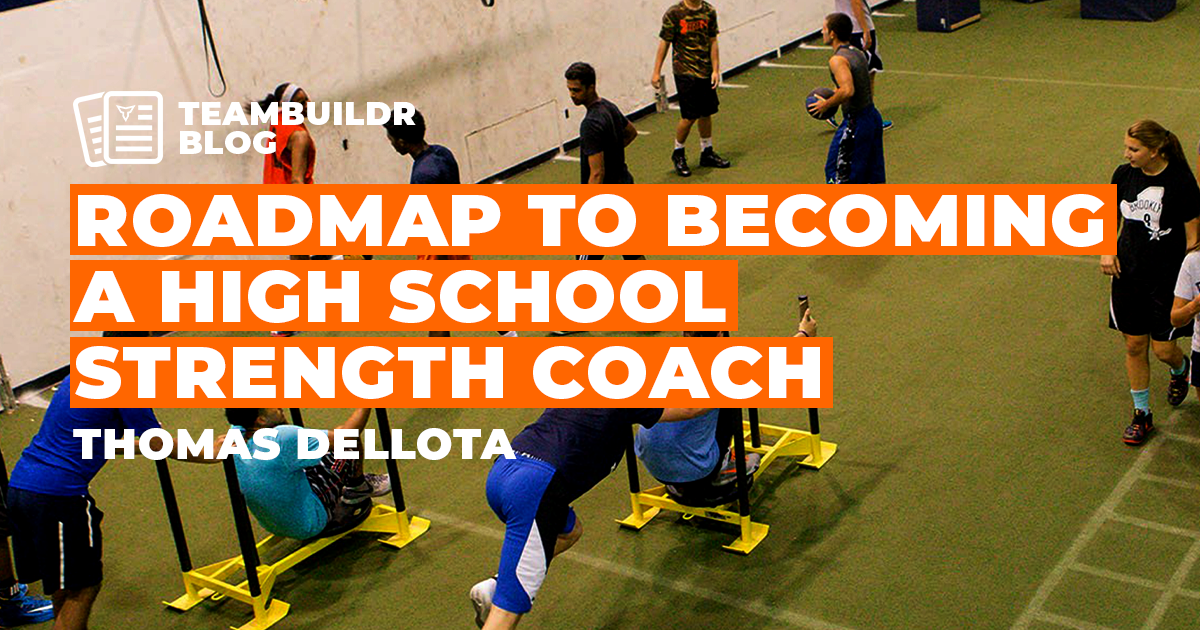Five Pieces of Advice for High School Strength Coaches from a College Strength Coach
Each year for the last 16 years, I get to work with about 200 freshmen student-athletes that decide to go to college at my school. They come from all over the country and some international locations too. Big city, suburb, and small town. Graduating high school classes of 1,000 or 30. I’ve seen it all, and from all walks of life or backgrounds.
These freshmen are the products of their high school’s athletic and strength programs. In all that time, working with all those people I’ve seen certain things that show up time and time again, year after year. What I am going to offer you is an outsider's view of general advice for the high school coach working with all their athletes.
Yeah I know, every situation is going to be different and coaching high school athletes is hard with well-meaning coaches who are doing the best they can, where they’re at, with what they have. My advice for coaches is not meant to be critical of anyone or their program. Got it? Good, here we go!
EMPHASIZE SPEED IN THE WEIGHT ROOM
We’ve heard it before. Speed kills. When you’re talking about team or individual sports the fastest people should always have the advantage. Coaches know this which is why they offer speed sessions where athletes are sprinting, cutting, and jumping. Great ideas, but you can do more. In the weight room, when athletes are lifting they have to move the weight up as fast as they can, every rep. The old adage of “train slow, be slow” is absolutely right. Now hold on, I’m not saying you cannot move heavy weight, but when you do the up part of the lift needs to be done as fast and hard as they can. PERIOD. We can get into the science and geek out over it later, but when you constantly bring the bar up fast or slow with heavy or lightweight that speed will carry over to sprinting, jumping, and playing. With that said, move the bar up fast.
To learn more about speed training, check out these posts:
The Single Biggest Key to Developing Speed in Youth Athletes
3 Sled Drills for Enhancing Speed and Agility
USE MORE THAN JUST A BAR
There is a special sort of sound that iron weights make when someone is squatting while repping out 405 or more. I am getting goosebumps just imagining it. It’s impossible to replicate that sound or the visual appeal of that lift with kettlebells, dumbbells, bands, or medicine balls. It’s a shame too, a lot of improvement is left on the table by neglecting those tools. Dumbbells and kettlebells help teach coordination and balance in a way a fixed barbell cannot. Medicine balls naturally have to be thrown hard and fast. Using jump bands can be used to make any bodyweight exercise harder or easier which is great for training around injuries. There’s a great big world out there, so don’t limit yourself to just a bar.
UNDERSTAND EVERYTHING YOU COACH
No one can be an expert in everything, I get that. I’m lucky because I get to coach people on how to lift, jump, and run for a living. There’s no excuse for me not to have a broad and deep understanding on how to do those things. I believe that if you are going to coach up an athlete, you do need to know what you’re doing.
It doesn’t matter if we’re talking about a jump shot, slap shot, single leg takedown, backstroke, or power clean. You need to know and teach the technical aspects of the skill. And for the record: just because you can do the skill doesn’t necessarily mean you can teach it. It’s a good start, but there is a big difference between doing and coaching. Luckily, there are some great organizations that have experts you can learn from.
My recommendations are the National Strength Coaches Association and the National High School Strength Coaches Association . If you’regoing to be coaching and working with high school athletes you should be a member if at least one of these organizations, if not both.
LIFT LIKE A GIRL
It’s true, I’ma football guy. I played the game, coached it, and love talking about it. What might be surprising is that I like coaching football players second to coaching women. Don’t boo me yet! I’ll always have a special place in my heart for football, but most of the women I’ve worked with over the years have taken over the top spot from the guys for three big reasons.
First, most of them have never done real strength training so there are no bad habits to break. Because of that, they can have some very fast and dramatic improvements. As a whole women have been more grateful for your time and energy to work with them.
If I was at a high school I would get girl-only lifting groups set as soon as I could. High school-aged girls have a reputation for being overly shy and not wanting to look silly, so set them up for success by removing the distraction and intimidation by having a co-ed session.
Still coach them up with energy and passion, demand excellence, and push them to be great. Trust me when I say this, the environment will not be the same as working with male athletes like football. And that’s perfectly fine by me.
ALWAYS BE SELLING
It’s amazing how and where people develop their opinions. You can have a highly educated person with years of experience, and in the minds of a high school student, they don’t know anything. Once an idea like that gets a foothold in someone’s mind, to remove it becomes a nightmare.
So how do you defeat an idea before it starts? You have to sell a better idea first. Think of it this way. Can you cook a better hamburger than McDonald's does? Of course, you can. So then why isn’t your burger the best-selling hamburger in the world? Because McDonald's spends a little under 1 billion US dollars on advertising. That’s why.
Take a lesson from Mickey D’s and always be selling. Find new and creative ways of promoting the success of your athletes. Promote it to your school’s administration, local TV and newspapers, every social media site, and to the athletes family every chance you get. Keep selling people on how great your program is, and you’ll have the athletes lining up to get in the gym.

Subscribe to our blog
Subscribe to receive the latest blog posts to your inbox every week.
Related posts

5 Pieces of Advice for High School Strength Coaches from a College Strength Coach

Roadmap to Becoming a High School Strength Coach
